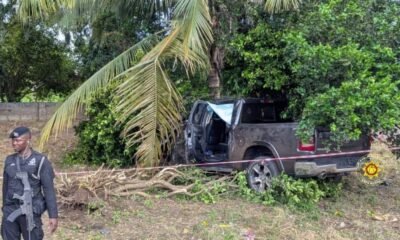Editorial
COVID-19 is real; let’s be up and doing
The world today has been plagued with the COVID-19 pandemic which has threatened the lives of people on earth and destroyed various forms of businesses, making it difficult for the entire world to move on peacefully as expected.
It is in the light of this that various pieces of advice have been thrown out to people in this country to know that the pandemic is not imaginary but real.
Many people have died from it as a result of negligence or accidental contact with infected persons.
The Spectator is, therefore, of the view that the time has come to intensify the campaign against the disease, so as to minimise its effect on people in this country.
By so doing, we will be enjoying life better than what can be enjoyed under the ‘atrocities’ of the pandemic.
Ghanaians and the rest of the world have been informed about contraction of the disease by Most Reverend Palmer Buckle, the Metropolitan Catholic Archbishop of Cape Coast. This man of God wants all Ghanaians in the world to know that COVID-19 is real for which reason we should all be up and doing.
Being up and doing simply means that we should know that the disease is real and can affect us when we come in contact with people who have been infected.
It is a well-known fact that Ghana has been hit with the second wave of the pandemic, leading to a surge in the positive cases being recorded.
This explains why day in day out our health professionals keep advising us to observe all the safety protocols as a way of helping to contain the disease or bringing it under control.
Even though the entire country needs to be protected from the pandemic, we are told that certain parts of the country are endangered with more positive cases than others. The Greater Accra Region leads in the case counts with the Ashanti Region coming second.
What this means for the whole country is that everyone must seriously observe the health safety protocols in order to avoid infection.
The dangers associated with contracting the disease is such that, we need to bring the disease under total control to ensure that, we are kept safe at all times. We do not have to panic, but be very conscious and avoid negligence, so as to avoid coming in contact with the disease.
This is important because even for those who have been infected and subsequently recovered from the disease, their systems have been affected adversely in one way or the other such that, some of them may not be as healthy as they used to be. Rigid observance of all the safety protocols is, therefore, non-negotiable.
Another issue that must not be overlooked is self-medication. Here, self-medication is dangerous so people should desist from that since it adds to risks of COVID-19 mobility.
The acting Director of the Ghana Infectious Disease Centre (GIDC), Dr Joseph Adjetey Oliver Commey, has advised the public against self-medication and rather seek early medication to help avert the rise in the rate of fatalities from the COVID-19.
This advice must be complied with to avoid worsening situations for anyone in the country.
The time to be serious about the disease is now, so we all need to contribute our quota in ensuring that COVID-19 is really brought under control in the interest of the nation.
Editorial
Put Metro Mass buses on Circle–Kasoa route
Dear Editor,
I write to appeal to the Metro Mass Transit Limited (MMTL) to put some of their buses on the Kasoa–Circle route to ease the challenges passengers face every day.
It might interest you to know that going to and from Kasoa is no child’s play. Sadly, it appears we have been left to our fate and at the mercy of greedy ‘trotro’ drivers who employ various tactics to extort money from passengers.
One of the means they usually employ is that at the station, they’ll tell passengers they are not going to Kasoa. However, when you join these vehicles, they take passengers to a point and start calling for new passengers to a different destination. It continues like that until they reach Kasoa. At all the new stops, they collect fresh fares from passengers.
So, it is not true that they are not going to Kasoa — the only reason they do that is to take more money from passengers.
By this behaviour, one ends up spending about GH¢20 for a journey that should cost around GH¢11, and the same amount on the return trip.
This behaviour also results in long queues at the stations at night, giving robbers and pickpockets a field day as they mingle with passengers struggling for transport and end up stealing from them.
I want to plead with the Metro Mass management to put buses on this route to reduce the inconvenience we go through after a day’s work.
The management could also devise ways to make their operations more convenient and reliable, and must consider setting specific times so that passengers would know when buses arrive and when they depart.
Kwesi Pino
Kasoa
Join our WhatsApp Channel now!
https://whatsapp.com/channel/0029VbBElzjInlqHhl1aTU27
Editorial
Deal with lurking dangers on pavements
Dear Editor,
I write with deep concern about a safety hazard and the dangers commuters are exposed to, especially those who walk in the area at night.
Along one of the busy roads in the capital — the Neoplan Station stretch of the ‘Accra Dubai’ road — lie several culverts with their metal coverings removed, leaving behind gaping holes that endanger everyone who uses the stretch.
It is a danger to commuters who walk around the area. As a regular visitor to that area, I find it very disturbing. In fact, a gaze into the drain can make one feel dizzy — it is very deep.
These are very common sights from the Railway Crossing area to the Awudome Cemetery area, bringing to the fore the activities of scrap dealers who are mostly blamed for the disappearance of the coverings.
They are dangerous and easy to miss. Children walking to school, the elderly, and even motorists risk serious injury if nothing is done.
This is not just a matter of inconvenience; it is a matter of life. We have seen too many cases where a simple oversight leads to irreversible harm.
A child could fall in. A motorcyclist could swerve and crash. A pedestrian could be injured in the dark. These are preventable tragedies, and we must treat them as urgent.
We cannot wait for disaster before we act. I urge the relevant authorities to inspect such areas, replace missing covers, and prioritise public safety. A simple fix today could save a life tomorrow. Let’s not look away — let’s fix what’s broken before it breaks someone.
Kelvin Acheampong
Dansoman
Join our WhatsApp Channel now!
https://whatsapp.com/channel/0029VbBElzjInlqHhl1aTU27






